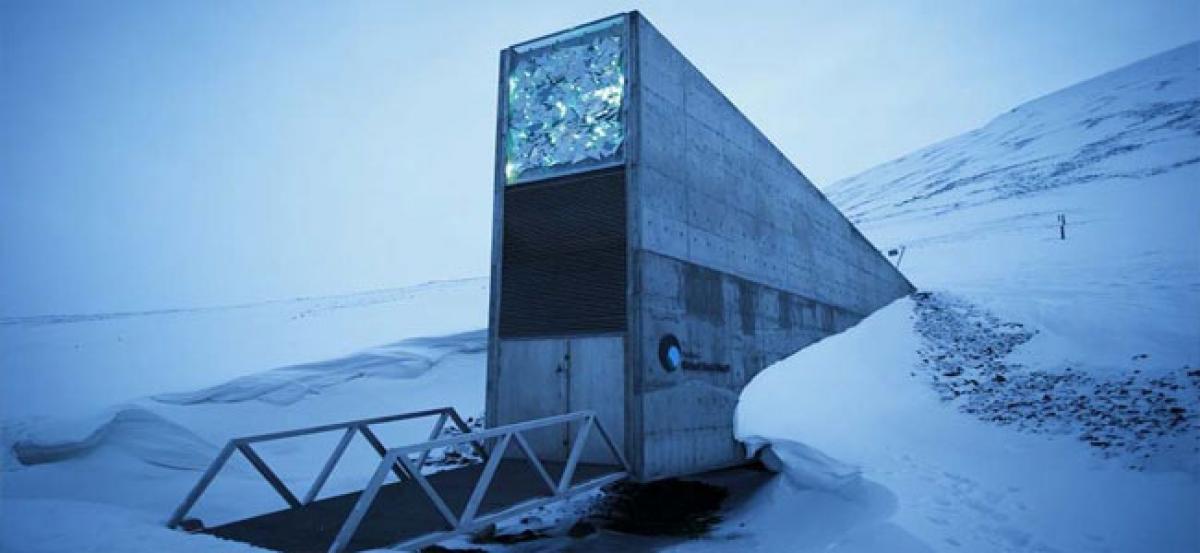Live
- LS polls: Union Minister Bhagwanth Khuba, Dingaleshwara seer, Priyanka Jarkiholi file nominations in K'taka
- Amid show of strength, Congress’ Praniti Shinde files nomination from Solapur
- Tamil Nadu Police gives clean report to Isha Foundation in missing volunteers case
- Home Minister Amit Shah to address public meeting in Goa on April 24
- Gurgaon Open: M Dharma fires 67 for two-shot lead on penultimate day
- Sharad Pawar made many attempts to finish Shiv Sena, claims Maha minister
- Former England opener Raman Subba Row dies aged 92
- IPL 2024: Impact player rule is affecting the progress of half all-rounders, says Zaheer Khan
- ‘Teppa samudram’ review: Entertains with twists and turns
- ‘Market Mahalakshmi’ review: Blends humour and heartfelt moments
Just In

The fear of a scorching summer has jolted scientists and anthropologists from across the globe. In keeping with this, the biggest seed vault known to mankind is undergoing a makeover and the reason for the same is ‘due to rising temperatures in the Arctic’. Designed to withstand a nuclear missile hit, the vault is nestled inside an Arctic mountain. However, the rising temperature in the region is
New Delhi: The fear of a scorching summer has jolted scientists and anthropologists from across the globe. In keeping with this, the biggest seed vault known to mankind is undergoing a makeover and the reason for the same is ‘due to rising temperatures in the Arctic’. Designed to withstand a nuclear missile hit, the vault is nestled inside an Arctic mountain. However, the rising temperature in the region is affecting the permafrost meant to protect it.
In preparation for doomsday, conservationist Cary Fowler, in association with the Consultative Group on International Agricultural Research (CGIAR), started the Svalbard Global Seed Vault in the remote Arctic Svalbard archipelago. The underground vault – that has also been called Noah's Ark for seeds – houses and protects the world's crops for a worst-case scenario, that is doomsday.
In an unexpected development, the permafrost, which was meant to help keep the temperature inside the vault at a constant -18 Celsius (-0.4 Fahrenheit), melted in 2016. "The summer season was (warmer) than expected. We had water intrusions in the (access) tunnel that could be related to climate change," Asmund Asdal, one of the seed bank's coordinators, told AFP.
The Arctic is warming twice as fast as the rest of the planet, scientific studies show. And while Europe is at the moment experiencing a subzero cold spell, the North Pole recently registered above-zero temperatures, 30 degrees higher than normal.
Scientists say warm spells like this are occurring with increasing frequency in the Arctic. Norway recently announced it would contribute 100 million kroner (USD 12.5 million) to improve the repository in a bid to protect the precious seeds. "We want to be sure that the seed vault will be cold throughout the whole year, even if the temperature continues to increase in Svalbard," Norway's Agriculture Minister Jon Georg Dale told AFP. The vault's raison d'etre was recently highlighted by the war in Syria, when scientists were able to withdraw seeds after a seed bank in Aleppo was destroyed in a bombing.
To access the heart of the vault where the seeds are stored, authorised visitors must first pass through heavy doors and a concrete, 120-metre tunnel, giving the chilling impression of delving into an Arctic abyss. The tunnel leads to three cold chambers protected by locked gates. Inside each one, seeds from all over the world are stored in sealed plastic boxes labelled with the country of origin and the variety.
Outside, nothing betrays the presence of the storage site so vital to humanity, apart from a monumental entrance: the narrow cement-and-steel rectangular portal juts out of the snow-covered mountainside, illuminated with artwork made of mirrors and bits of metal that create a colourful prism visible for miles around.
On the mountain, workers' cabins dot the slope amid construction cranes and machinery, soiling the otherwise pristine white landscape. Renovations to shore up the fortress are already under way. The improvements will enable it to "handle the climate for the next decades", said Dale.The access tunnel will be reinforced, and a cabin will be built near the site to house the technical materials that can generate heat -- to prevent a recurrence of melting permafrost.
At the foot of the mountain, the fjord's swirling waters are a worrying indication of the state of the climate, according to Marie Haga of the Global Crop Diversity Trust, one of the seed vault's three partners alongside Nordic gene bank NordGen and the Norwegian government. "When I came after 1985, it was completely frozen," she recalled.

© 2024 Hyderabad Media House Limited/The Hans India. All rights reserved. Powered by hocalwire.com







